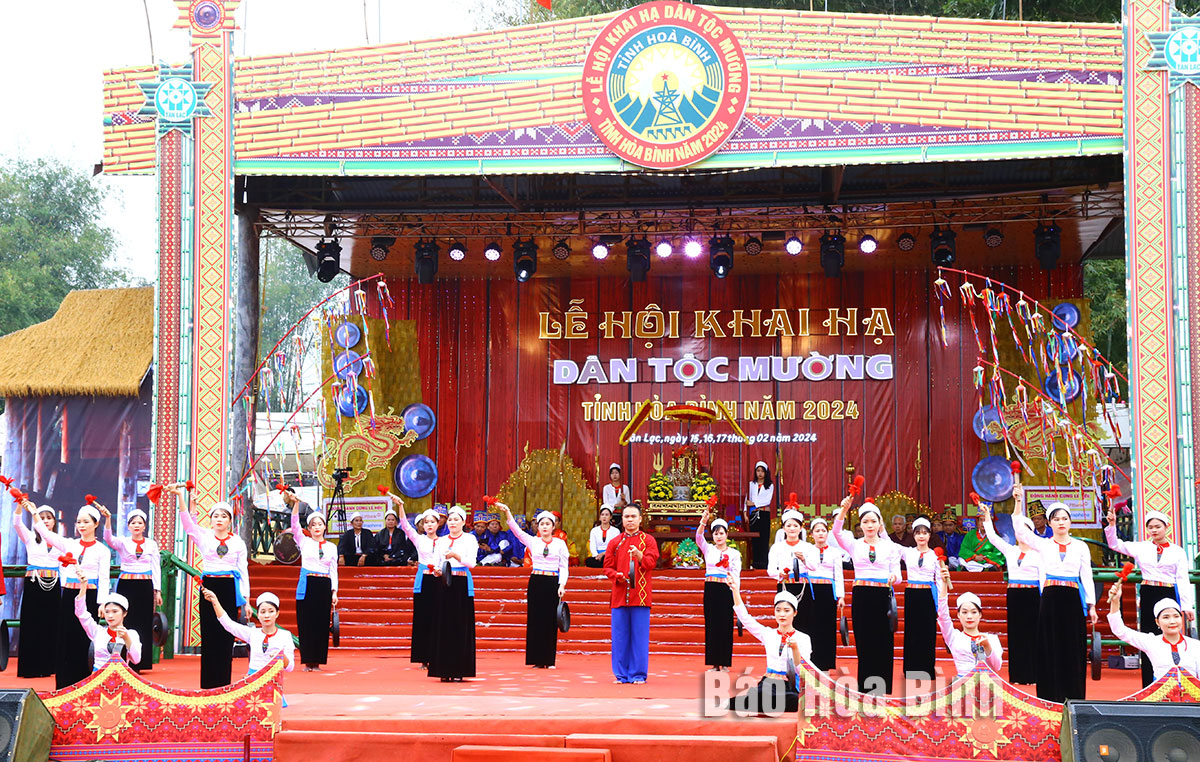The northern province of Hoa Binh has paid much attention to preserving and promoting the traditional cultural values of ethnic minority groups in recent years. A new point in its preservation efforts is to build "living museums" in each ethnic communities, promoting endogenous strength to preserve and promote the value of cultural heritage.
The Muong ethnic group's Khai Ha
festival in Hoa Binh province is a national intangible cultural heritage.
To facilitate the preservation, the province reviewed all intangible cultural
heritages of the ethnic groups. As the results, the province now has 786
heritages, including types of languages, writings, folk literature, folk
performing arts, traditional crafts, social customs and beliefs of the five
ethnic minorities of Muong, Thai, Tay, Dao, Mong.
Of these, five national heritages are Mo Muong, Muong gong art (recognised in
2016); folk knowledge of the bamboo calendar of the Muong, Khai ha (going down
to the field) festival of the Muong people in Hoa Binh (recognised in 2022);
social customs and Keng Loong belief of the Thai people in Mai Chau district
(recognised in 2023).
Mo Muong has great significance in the spiritual life of the Muong people,
containing many unique and precious values. The Prime Minister has agreed to
compile a national dossier for Mo Muong to seek UNESCO's recognition in the
List of Intangible Cultural Heritage in Need of Urgent Safeguarding. Up to now,
the dossier has been completed, and the Government has issued a document
agreeing to send the dossier to UNESCO for consideration.
As one of the people who participated in the filming process in the National Mo
Muong Dossier, shaman Bui Van Rum, of Rom Co hamlet, Thuong Coc commune, Lac
Son district, said that since he was a child, he liked listening to Mo. When he
was 40, he officially started this profession. Rum said he is the 8th
generation of his family to practice the profession.
"I really like the humanity expressed in the Mo songs,” he said, adding that
shamans hope that the good values of Mo Muong will be promoted, introduced to
the world and passed to future generations.
In addition, dossiers for other heritages are also completed to seek
recognition as national intangible cultural heritages such as Muong skirt
pattern weaving techniques and folk songs, love songs (Thuong Dang and Bo Met)
singing.
The province has also paid attention to managing relics, artifacts, and
antiquities - important materials to help learn about the history and culture
of the Muong people, as well as the culture and civilisation of the ancient
Vietnamese people.
The province hâs implemented a project on construction, restoration,
preservation, and promotion of tangible and intangible cultural values in the
province in the 2023 – 2030 period.
Hoa Binh province is home to 41 national-level relics; 71 provincial-level
relics; 303 relics and scenic spots that have been added in the protection
list.
It holds 73 traditional festivals of ethnic groups annually.
Many folk festivals of ethnic minority groups have been restored and maintained
including Tien pagoda festival, Khai Ha festival, Muong Thang festival, Muong
Dong festival, and Bo temple festival.
To meet the people’s needs in enjoying and creating culture and
art, in recent years, many traditional cultural and art clubs have been
established across the province.
Classes of Muong ethnic language, Muong gong art, and Muong,
Dao, and Tay ethnic brocade weaving have been opened in the districts of Tan
Lac, Lac Son, Cao Phong, Kim Boi, Luong Son, Lac Thuy, Mai Chau, and Da Bac.
Up to now, the whole province has 1,482 art troupes in villages,
hamlets, and residential groups. In some hamlets and villages that develop community-based
tourism, troupes regularly perform to serve tourists.
To build "living museums" in the community to preserve
traditional cultural values, Hoa Binh has built the Muong Cultural Space
Conservation Area in Tan Lac and Cao Phong districts.
Private museums in the province have restored and displayed many valuable
artifacts such as Muong Cultural Heritage Museum, Thai Mai Chau Cultural
Artifacts and Antiques Exhibition House; and Muong Cultural Space Museum.
The formation of "living museums" in tourist villages
and communities contributes to preserving and spreading the good values of Hoa
Binh culture and people.



